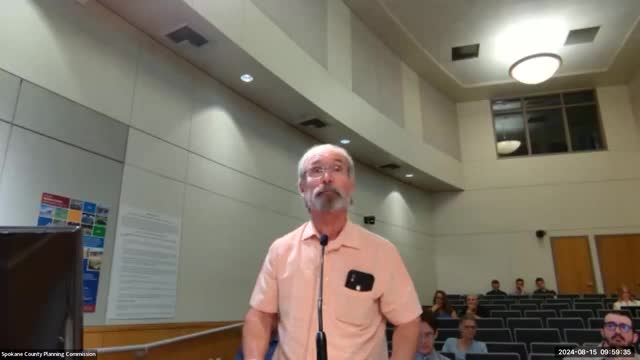Concerns Rise Over Renewable Energy's Impact on Wildlife
August 20, 2024 | Spokane County, Washington
This article was created by AI summarizing key points discussed. AI makes mistakes, so for full details and context, please refer to the video of the full meeting. Please report any errors so we can fix them. Report an error »

During a recent government meeting, officials engaged in a robust discussion regarding the long-term implications of renewable energy projects, particularly focusing on the impact of dams and turbines on local wildlife and the environment. A key speaker highlighted the significant investments made by the Rocky Reach Dam, which has reportedly contributed $60 million towards fish survival initiatives, achieving a 97% survival rate for fish using advanced technology. However, concerns were raised about the potential detrimental effects of new turbine technology on bird populations, with specific mention of eagles and ospreys being at risk.
The conversation also touched on the broader environmental considerations associated with renewable energy, including visual and noise pollution, as well as the ecological impact of construction and maintenance of energy facilities. One participant expressed a desire for more time to evaluate these issues thoroughly before moving forward with any decisions, emphasizing the need for a balanced approach that considers all environmental factors.
In addition to renewable energy discussions, the meeting included a mention of potential small-scale nuclear energy projects. Officials noted that there are ongoing conversations about citing these facilities on the Hanford federal reservation, which could provide a new energy source for the region. The idea of a 50-megawatt nuclear plant backed by Microsoft in Malaga was also brought up, indicating a growing interest in diversifying energy sources.
The meeting concluded with a focus on housing policy updates, as officials prepared to share new guidelines in response to recent legislative changes affecting the Growth Management Act. This included a requirement to allocate housing by income brackets, reflecting the ongoing efforts to address housing needs in the community.
Overall, the discussions underscored the complexities of energy development and environmental stewardship, highlighting the need for careful consideration of both immediate benefits and long-term consequences.
The conversation also touched on the broader environmental considerations associated with renewable energy, including visual and noise pollution, as well as the ecological impact of construction and maintenance of energy facilities. One participant expressed a desire for more time to evaluate these issues thoroughly before moving forward with any decisions, emphasizing the need for a balanced approach that considers all environmental factors.
In addition to renewable energy discussions, the meeting included a mention of potential small-scale nuclear energy projects. Officials noted that there are ongoing conversations about citing these facilities on the Hanford federal reservation, which could provide a new energy source for the region. The idea of a 50-megawatt nuclear plant backed by Microsoft in Malaga was also brought up, indicating a growing interest in diversifying energy sources.
The meeting concluded with a focus on housing policy updates, as officials prepared to share new guidelines in response to recent legislative changes affecting the Growth Management Act. This included a requirement to allocate housing by income brackets, reflecting the ongoing efforts to address housing needs in the community.
Overall, the discussions underscored the complexities of energy development and environmental stewardship, highlighting the need for careful consideration of both immediate benefits and long-term consequences.
View full meeting
This article is based on a recent meeting—watch the full video and explore the complete transcript for deeper insights into the discussion.
View full meeting
